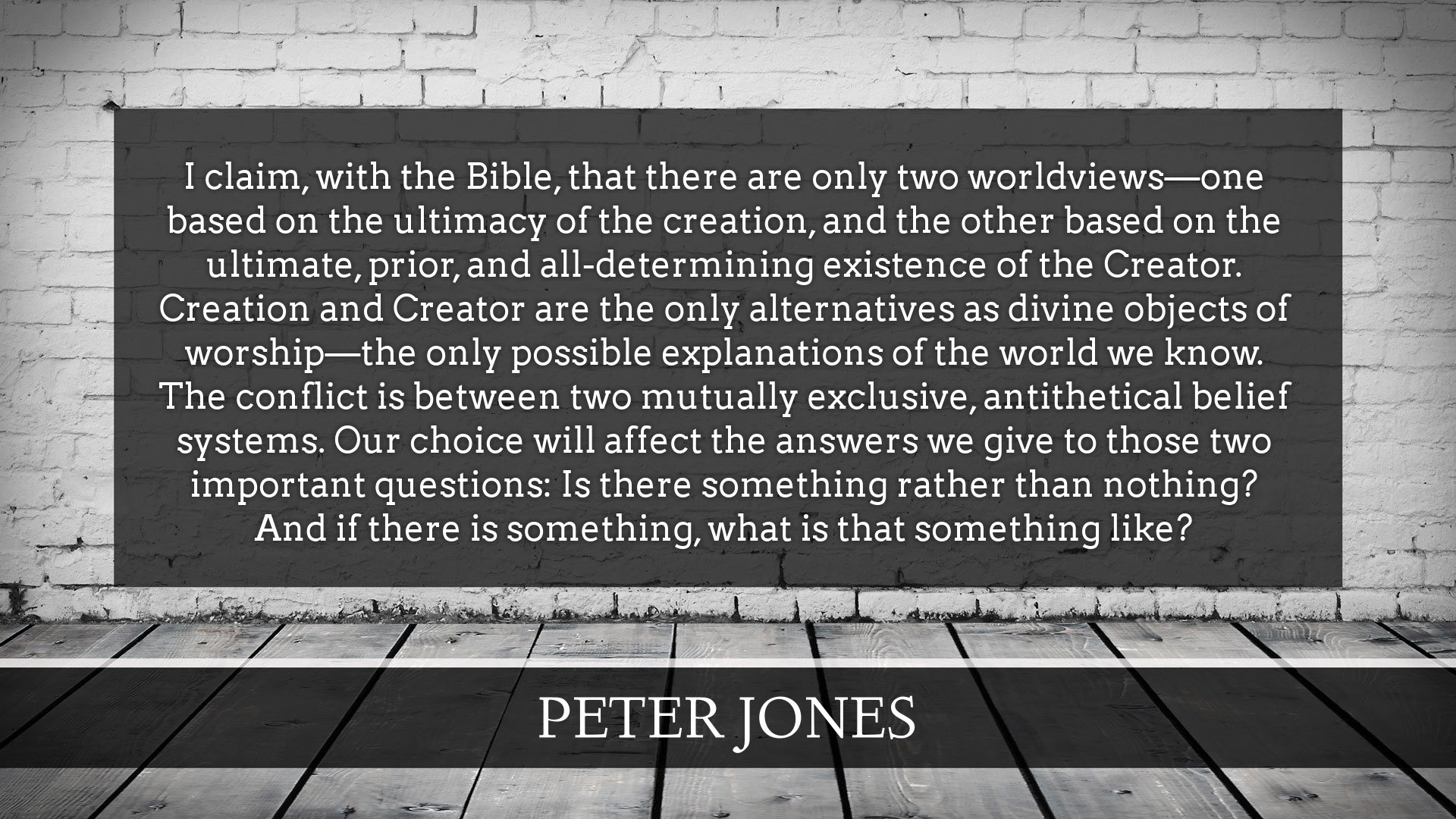
Paganism, or Not Paganism
From Peter Jones book, The Other Worldview: Exposing Christianity’s Greatest Threat. Bellingham, WA: Kirkdale Press, 2015:
Our Worldview Alternatives: Oneism and Twoism
I claim, with the Bible, that there are only two worldviews—one based on the ultimacy of the creation, and the other based on the ultimate, prior, and all-determining existence of the Creator. Creation and Creator are the only alternatives as divine objects of worship—the only possible explanations of the world we know. The conflict is between two mutually exclusive, antithetical belief systems. Our choice will affect the answers we give to those two important questions: Is there something rather than nothing? And if there is something, what is that something like?
For the sake of simplicity, I call these two alternatives Oneism and Twoism.1 They are not mere variations on a general spiritual theme, but the only two timeless, mutually contradictory ways to think about the world. In these two terms (Oneism and Twoism), there is a universe of difference. These are the only two destinations on the tracks we can travel; let’s map them out in more detail now.
Oneism
Oneism sees the world as self-creating (or perpetually existing) and self-explanatory. Everything is made up of the same stuff, whether matter, spirit, or a mixture. There’s one kind of existence, which, in one way or another, we worship as divine (or of ultimate importance), even if that means worshiping ourselves. Though there is apparent differentiation and even hierarchy, all distinctions are, in principle, eliminated, and everything has the same worth. This is a “homocosmology,” a worldview based on sameness. The classic term for this is “paganism,” worship of nature.
Twoism
The only other option is a world that is the free work of a personal, transcendent God, who creates ex nihilo (from nothing). In creating, God was not constrained by or dependent on any preexisting conditions. There is nothing exactly like this in our human experience of creating; our creative acts are analogous to God’s. There is God, and there is everything that is not-God—everything created and sustained by the Father, the Son, and the Holy Spirit. This worldview celebrates otherness, distinctiveness. We only worship as divine the distinct, personal, triune Creator, who placed essential distinctions within the creation. This is a “heterocosmology,” a worldview based on otherness and difference. This is often called “theism.”2
Both of these worldviews, whether implicitly assumed or explicitly embraced, require the same fundamental certainty. In other words, if one is ultimately true, the other must be false. In the moral universe of the Bible, knowledge is never neutral. That’s why Paul calls these worldviews “the truth” and “the lie” (Rom 1:25).
Endnotes:
1 I am not inventing anything other than a simplified terminology. Other descriptions of the two options include biblical faith or paganism, monism or theism, or the Creator/creature distinction.
2 If this is the biblical worldview, how does one relate it to Rabbinic Judaism and Islam, whose followers also claim to respect the Bible (though in very different ways)? There is only one pure Oneist—Satan—and one pure Twoist—Jesus Christ. Judaism and Islam have a defective view of biblical Twoism. Their denial of the Trinity leaves them with a transcendent yet impersonal God (an attempt at Twoism), who ultimately depends upon his relationship with human beings in order to constitute his personhood (which ends up in Oneism by a circuitous route). Rabbinic scholar Abraham Heschel (1907–1972) rightly critiqued Islam for seeing God as “unqualified Omnipotence,” who can never be “the Father of mankind,” and thus is radically impersonal. See Heschel, The Prophets (New York: Harper, 1962), 292, 311. Yet postbiblical Judaism cannot escape Heschel’s critique entirely. The medieval rabbi Maimonides, for example, also confessed an “absolutely transcendent God who is independent of humanity.” See Reuven Kimelman, “The Theology of Abraham Joshua Heschel,” First Things (Dec 2009). On the other hand, Kimelman notes that Heschel commits the opposite error to that of Maimonides (and Islam), namely that of making God dependent on man in a covenantal relationship that both God and man need in order to be who they are. Heschel adopts the rabbinical concept that it is human witness that in some sense makes God real (Kimelman, “The Theology of Abraham Joshua Heschel”). Once more, God is dependent upon humanity. This is the classic dilemma of a monotheism without the Trinity. Because Heschel does not believe God to be triune, God depends on man to be personal and therefore cannot be “Wholly Other” in relation to creation.
Peter Jones, The Other Worldview: Exposing Christianity’s Greatest Threat (Bellingham, WA: Kirkdale Press, 2015), 12–13.
Only Two Worldviews
“I claim, with the Bible, that there are only two worldviews—one based on the ultimacy of the creation, and the other based on the ultimate, prior, and all-determining existence of the Creator. Creation and Creator are the only alternatives as divine objects of worship—the only possible explanations of the world we know. The conflict is between two mutually exclusive, antithetical belief systems. Our choice will affect the answers we give to those two important questions: Is there something rather than nothing? And if there is something, what is that something like?”
Peter Jones, The Other Worldview: Exposing Christianity’s Greatest Threat (Bellingham, WA: Kirkdale Press, 2015), 12.



